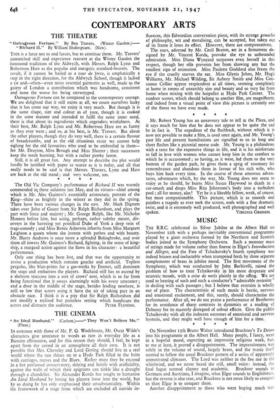THE CINEMA
it An Ideal Husband." (Carlton.)--" They Won't Believe Me." (Plaza.)
IN common with those of Mr. P. G. Wodehouse, Mr. Oscar Wilde's characters give utterance to words as rare in everyday life as a Russian affirmative, and for this reason they should, I feel, be kept apart from the crowd in an atmosphere all their own. It is not possible that Mrs. Cheveley and Lord Goring should live in a real world where the sun shines on to a Hyde Park filled to the brim with carriages, nurses and the Blues. Rather must they be encased in a hot perfumed conservatory, shining and brittle with artificiality, against the walls of which their epigrams can tinkle like a draught through a chandelier. Sir Alexander Korda has sought to humanise An Ideal Husband by letting his players loose into the world, but by so doing he has only emphasised their unsubstantiality. Within the framework of a stage from which are excluded all outside in-
fluences, this Edwardian conversation piece, with its strange gouache of philosophy, wit and moralising, can be accepted, but taken out of its frame it loses its effect. However, there are compensations.
The stars, adorned by Mr. Cecil Beaton, set in a firmament de- signed by Mr. Vincent Korda, provoke the eye to unbounded admiration. Miss Diana Wynyard surpasses even herself in this respect, though her role prevents her from showing any but the smallest sign of animation. Miss Paulette Goddard also feasts the eye if she cruelly starves the ear. Miss Glynis Johns, Mr. Hugh Williams, Mr. Michael Wilding, Sir Aubrey Smith and Miss Con- stance Collier appear resplendent at all times, seeming completely at home in rooms of unearthly size and beauty and so very far from home when mixing with the hoipolloi at Hyde Park Corner. The outdoor scenes, which should belong to another film, are magnificent, and indeed from a visual point of view this picture is certainly one of the finest we have ever made.
* * * *
Mr. Robert Young has an unsavoury tale to tell at the Plaza, and it says much for him that he does not appear to be quite the cad he in fact is. The expedient of the flashback, without which it is now not possible to make a film, is used once again, and Mr. Young's past life and present humiliations are signalled to us in long and short flashes like a pictorial morse code. Mr. Young is a philanderer with a taste for the expensive things in life, and it is his misfortune to fall in love with women who cannot keep him in the comfort to which he is accustomed ; so having, as it were, led them to the very bottom of the garden path, he gives them a sprig of rosemary for remembrance and abandons them in favour of his rich wife, who buys him back every time. In the course of these amorous adven- tures, adventures which, by the way, Mr. Young does not seem to enjoy as he shorlld, he burns Miss Susan Haywood to death in a car-smash and drops Miss Rita Johnstone's body into a turbulent pool ; all for money, alas! Yet he is a likeable fellow, weak, of course, but most companionable. This picture, which is as smooth and painless a tragedy as ever took the screen, ends with a fine dramatic twist, and it is extremely well produced, well photographed and well


































 Previous page
Previous page